Iran Says Ready To Send Medical Personnel, Vaccines To China
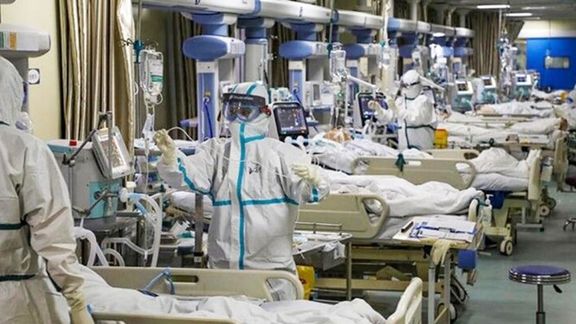
The spokesman for Iran’s Covid-19 taskforce says the country is ready to send medical personnel and vaccines to China if needed.

The spokesman for Iran’s Covid-19 taskforce says the country is ready to send medical personnel and vaccines to China if needed.
Abbas Shirozhan said in a series of tweets on Saturday that the Islamic Republic ranks 12 in the world in research related to the coronavirus and boasted about the low number of Covid-19 fatalities.
However, reports suggest that the number of Covid-related deaths in Iran is much higher than the official figure of over 141,000. Official records show that since the pandemic began in early 2020, deaths have been 300,000 higher than before, suggesting more Covid deaths that official figures indicate.
Covid cases have surged in China in recent weeks, with new strict quarantines enforced by tough government measures.
Shirozhan said the Iranian producers of vaccines are allowed to export their home-grown vaccines to other countries, while earlier in the month Iran’s national carrier Iran Air said Iraq does not allow entry to visitors who have received Iranian-made vaccines. Iran has approved at least six homegrown vaccines for production, although none have received international approval.
Iran itself was able to vaccinate most of its population only when China began shipping tens of millions of doses in August 2021. Iranian-made vaccines never reached a high level of production.
Tens of thousands died between June-September 2021, when the government was banned by Supreme Leader Ali Khamenei from importing British and American vaccines on political grounds.
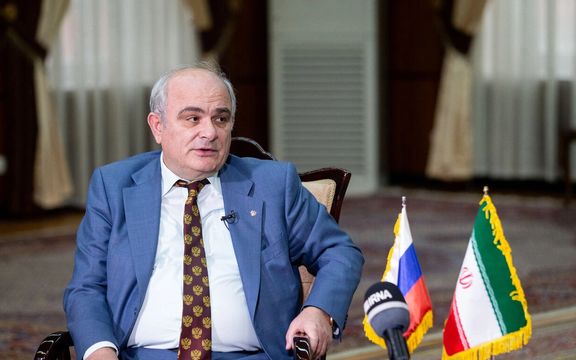
The Russian envoy in Tehran has accused some Iranian media of provoking anti-Russian sentiments among Iranians over Moscow's role in Vienna nuclear talks.
In early March, during talks to restore the 2015 nuclear deal (JCPOA), Russia demanded exemption from the United States regarding Ukraine sanctions in all its dealings with Iran.
In an interview with Khabar Foori news website published Friday, Levan Dzhagaryan(Jagaryan) criticized Iranian media for alleging that Russia’s demand had disrupted the JCPOA talks in Vienna, which supposedly was near a successful conclusion.
Iranian media and the public had indeed expressed outrage at Russia’s demand, seeing it as a hurdle in the way of conclusion of an agreement and blackmail.
After Washington's refusal to budge, and Iranian media's strong criticism, Moscow appeared to back off and seek only guarantees related to the implementation of the 2015 deal rather than all economic relations as initially demanded.
"They are printing one-sided anti-Russian articles every day. It seems that they have turned into the Iran-based branch of the BBC's Persian radio," Dzhagaryan said. He singled out the reformist Etemad newspaper as an media outlet critical of Russia.
"They should ask the members of the Iranian negotiation team. They regularly express their gratitude that Russia and particularly our representative in the Vienna [talks], Mr. [Mikhail] Ulyanov helps a lot … We have always helped, are helping and will help together with our Chinese friends," the Russian envoy said.
In the interview with Khabar Foori, the Russian envoy in Tehran admitted that he was "very worried" about public opinion in Iran turning against Russia. "With the works that we do with your help, and the help of other independent media that aren't under Western influence and don't listen to the BBC, we try to explain [our views to them]," he said.
Dzhagaryan claimed that media in Iran couldn't be prevented from criticizing Russia because of freedom of expression in Iran. "Iran is much more advanced [in freedom of expression] than European countries."
Dzhagaryan also denied that Russia may consider itself Iran's rival in the energy market and therefore not happy with the prospects of US lifting sanctions on Iran which will allow Iranian crude oil to flow into international markets. "[Such allegations] are only a plot of the enemy that opposes [close] relations between Iran and Russia and are looking for excuses to cast a shadow on it."
Many Iranians have a historical bias and distrust towards Russia for historic interferences in Tsarist times in Iran's domestic affairs, wars fought between the two countries, and later, the continuation of the same policies by the Soviets.
Russia's proactive role in the Vienna talks also caused concerns among Iranians. The remarks and photos of the meetings posted by the Russian envoy on Twitter occasionally offered fuel for controversy and many alleged that Ulyanov was running the talks instead of the Iranian negotiators and making announcements on their behalf.
The Russian envoy to Tehran has become quite a controversial figure in Iran in recent months.
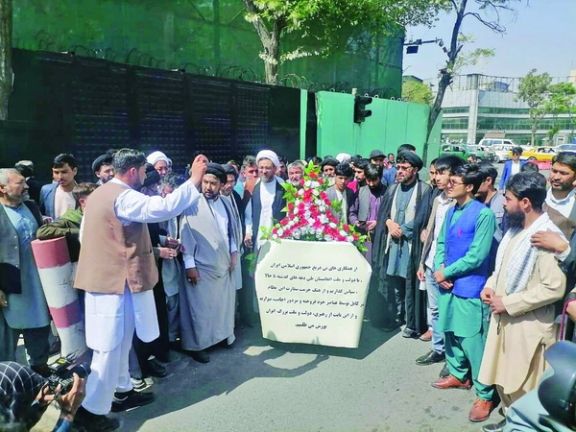
Taliban forces have closed a center with links to Iran that had organized a gathering in front of Tehran’s embassy in Kabul to express support for the Islamic Republic.
Tebyan Center for Socio-Cultural Activities, the organizer of the event, said in a statement on Friday that Taliban agents arrested the head of their office Yarmohammad Rahmati on Thursday.
The center held a pro-Iran rally on Wednesday with participants placing flowers on the doors of the embassy building and reading a statement about “solidarity between the brotherly nation of Iran and Afghanistan”.
The Tebyan Center denied reports that the it was shut down completely and said only its activities are restricted without providing details.
There are reports that Taliban has also arrested several people who were connected to the center in Herat.
Protestors Monday attacked the Iranian consulate in Herat hurling stones, smashing security cameras, and burning tires before they were dispersed by Taliban security. Earlier Monday, people also held a demonstration outside Iran’s embassy in Kabul over alleged mistreatment of Afghan immigrants in Iran.
Following the attacks, Iran’s Foreign Ministry said Tehran will not resume its consular services before receiving assurances from Afghan authorities over protection of its diplomatic missions in Afghanistan.
Sectarian tensions have risen since the recent killing of two Shia clerics in Imam Reza shrine, Mashhad, in Iran attributed to Sunni extremists.
The number of Afghan refugees in Iran are increasing after the Taliban takeover last year.
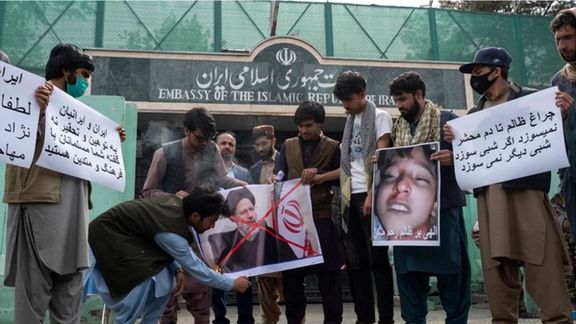
Iran summoned Afghanistan’s chargé d'affaires over an attack Herat consulate on Monday, and suspended services of all its consular missions across the country.
The head of the South Asia Department at Iran’s Foreign Ministry, Rasoul Mousavi, said on Tuesday that the missions of the Islamic Republic will resume their services once Afghanistan ensures their security.
Protestors Monday attacked the Iranian consulate in Herat, Afghanistan, hurling stones, smashing security cameras, and burning tires before they were dispersed by Taliban security. Earlier on Monday, demonstrators outside Iran’s embassy in Kabul held banners with pictures of refugees and the words "Isn't Afghan a human being?"
Interior Minister Ahmad Vahidi also said on Tuesday that the attacks have been organized by “the enemy” and aimed at sowing discord between Iran and Afghanistan.
Warning of efforts on social media to whip up anti-Iranian sentiment over alleged mistreatment of Afghan immigrants in Iran, foreign ministry spokesman Saeed Khatibzadeh called on Taliban officials to ensure the security of Iran’s embassy in Kabul and its missions across Afghanistan.
Sectarian tensions have risen since last week’s killing of two Shia clerics in Imam Reza shrine, Mashhad, attributed to an Afghan migrant. Many Afghans are in Iran unofficially, with numbers increasing since the Taliban took Kabul last year as the United States ended its 20-year military presence.
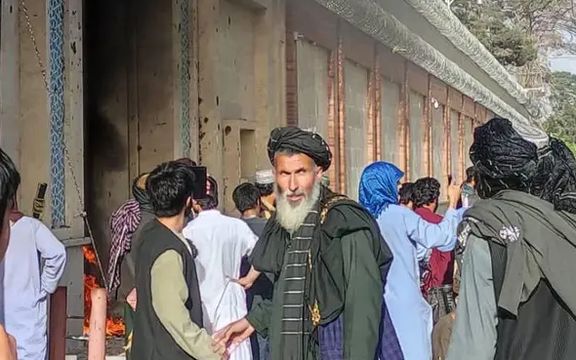
Tehran on Tuesday summoned the Afghan chargé d'affaires to protest an attack on its consulate in Herat on Monday and halted consular services in Afghanistan.
According to a statement published on the its website, the ministry's director-general for South Asia told the Afghan chargé d'affaires that Tehran will not resume its consular services before receiving assurances from Afghan authorities over protection of its diplomatic missions in Afghanistan. The Iranian official also demanded punishment of those behind the attack.
Protesters on Monday set fire to tires in front of the Iranian consulate in Herat, pelted the building, burned the Iranian flag, and destroyed security cameras. Taliban forces reportedly dispersed the angry Afghan crowd by firing shots in the air.
According to Afghanistan's TOLOnews, dozens of Afghans protested against Iran in Kabul and the south-eastern province of Khost. A banner carried by protesters in Kabul Monday said "Stop Killing Afghans" while another said Afghans will never forget the mistreatment of their compatriots in Iran. A video published on Twitter by Afghanistan's Aamaj News shows protesters marching in front of the Herat consulate and chanting "Death to Iran".
Tensions between Iranians and Afghans have risen since last week’s killing of two Shiite clerics at Imam Reza shrine, Mashhad, reportedly by an Afghan national.
Following the attack some videos began circulating on social media to portray mistreatment of Afghans by Iranians. The videos alleged that some Afghans had been verbally, physically, and sexually abused by Iranian mobs, border guards and police. The authenticity and time of the videos cannot be independently verified.
In an interview with Afghanistan's TOLOnews on Monday, the Iranian envoy to Kabul, Bahador Aminian, claimed that the Mujahedin-e Khalq, a group based outside Iran and considered as a terrorist group by Tehran, was behind the dissemination of the provocative videos on social media to ruin Tehran-Kabul relations.
Tasnim news agency which is affiliated to Iran's Revolutionary Guards (IRGC) on Monday claimed that "western-backed" political groups in Afghanistan were behind the recent events and have called for more protests against Iran in the coming days.
At his weekly press briefing on Monday, after the attack on the consulate in Herat, Iran's foreign ministry spokesman, Saeed Khatibzadeh, said the influx of Afghan refugees to Iran cannot continue considering Iran's limited capacities and urged the Taliban to exercise responsibility and to protect Iranian diplomatic venues in Herat and other Afghan cities.
Khatibzadeh also said there were plots by "certain ill-wishers" to foment Iranophobia in Afghanistan and Afghan-phobia in Iran.
The Taliban foreign ministry on Friday said it had summoned officials of the Iranian embassy in Kabul in connection with "abuses against Afghan refugees in Iran" following the recent stabbing of Iranian clerics in Mashhad.
Last week Foreign Minister Hossein Amir-Abdollahian said since the Taliban took power in August last year one million more Afghans have entered Iran, bringing the number of refugees and economic migrant to five million.
Thousands of Afghans fleeing the economic hardships under the Taliban enter Iran daily from official border points or illegally from other areas along the 900 km border to find work in Iran to support their families back home or to continue their journey towards Europe.
Some officials claim as many as 5,000 Afghans a day have been entering the country in recent months.
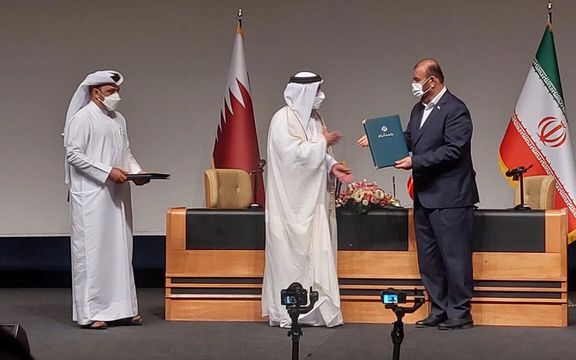
Iran and Qatar have signed six agreements for closer cooperation in air and sea transport, particularly during the 2022 FIFA World Cup scheduled for November-December in Qatar.
During a ceremony on Iran’s southern island of Kish Monday, Iranian road minister Rostam Ghasemi and Qatari transport minister Jassim bin Saif Al-Sulaiti inked documents over accommodation, and air and maritime transport for those attending the soccer tournament.
Qatar is expecting 1 million visitors. Iran and Qatar plan 400 direct flights between Kish and Doha, as well as four cruise liners linking Iranian and Qatari ports, during the event. Kish island, off the southern coast of Iran in the Persian Gulf, is 270km from Doha, only 40 minutes by plane and five or six hours by sea. It expects to host nearly 100,000 soccer fans.
Last week President Ebrahim Raisi spoke by telephone with Qatar’s Emir Sheikh Tamim bin Hamad Al Thani to discuss Iran’s role in the World Cup through Kish and other islands nearby.
Iran’s team has been drawn in Group B of the competition along with England, the United States, and the winner of European playoffs between Ukraine, Scotland, and Wales. Iran beat the US 2-1 in the 1998 World Cup in France, its first ever victory in the competition.